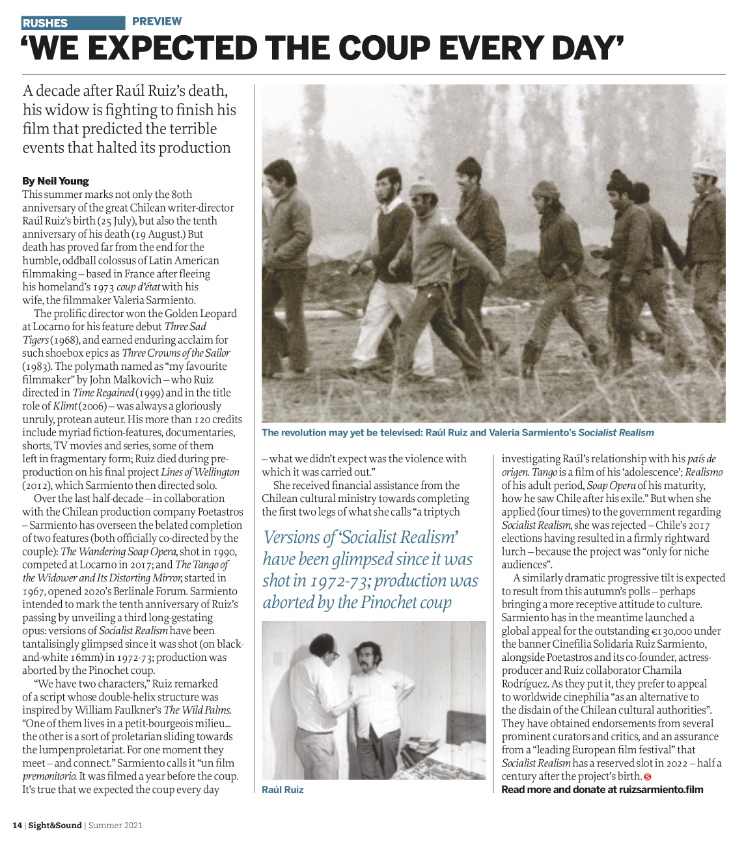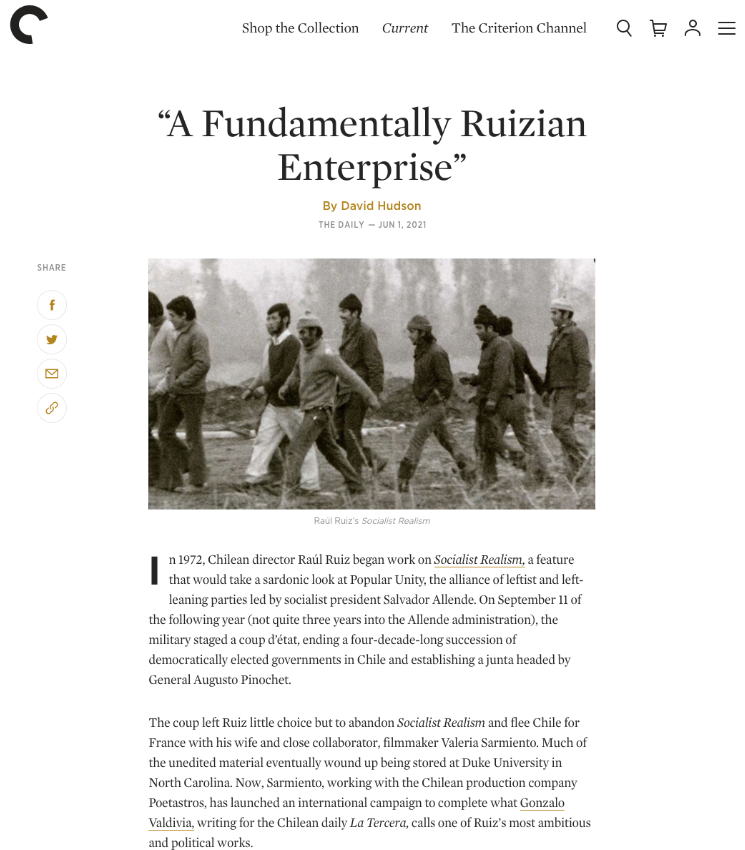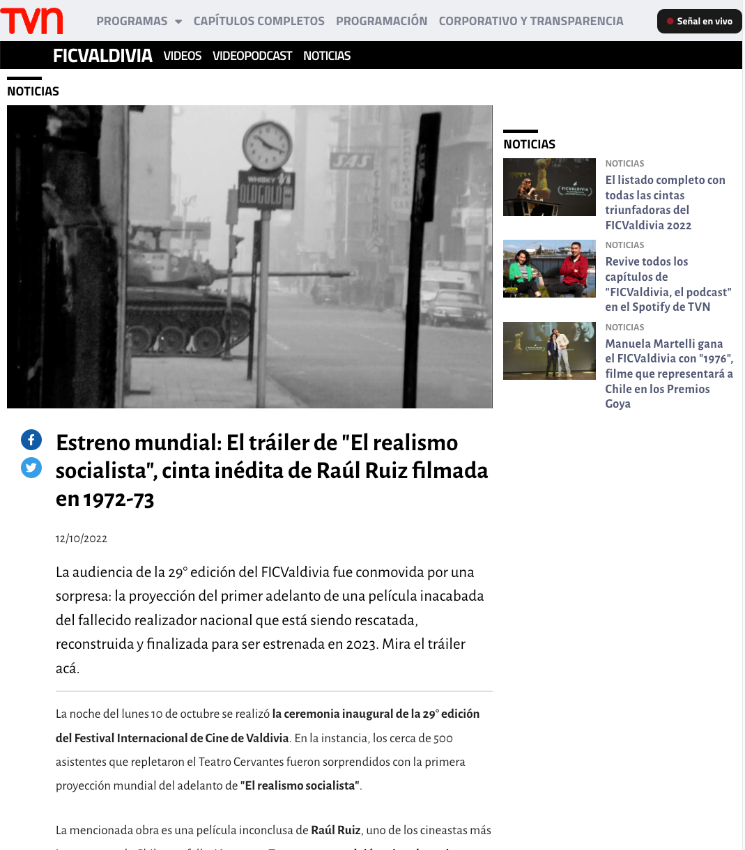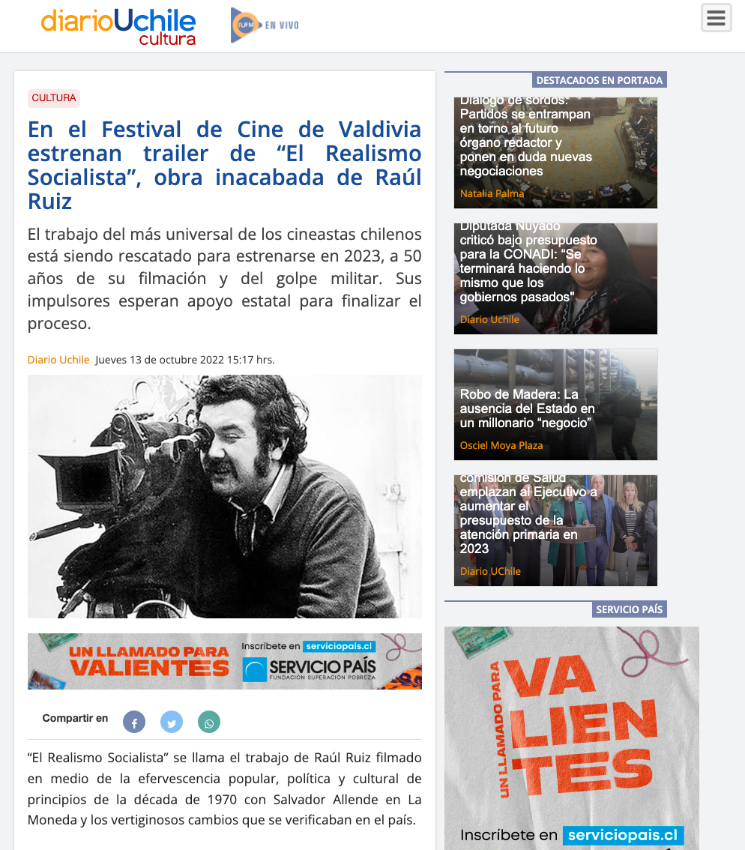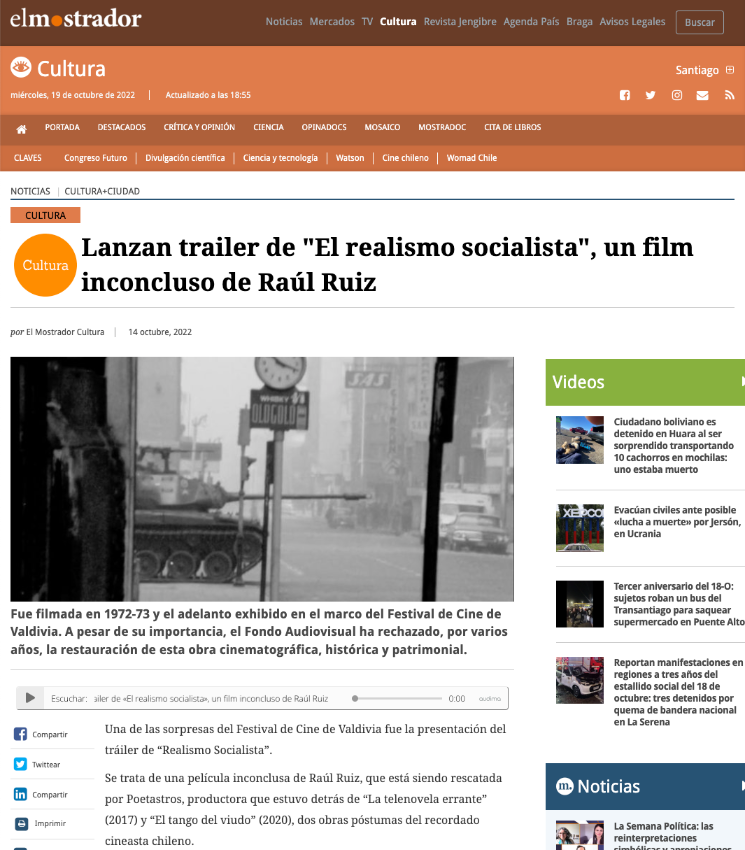Synopsis
"The film is an ensemble, where different worlds are chained together. On the one hand that of the workers and the 'lumpen', with the character Lucho at the head, and on the other, that of a group of intellectuals who support the Unidad Popular government and are grouped together in a poetic front, more representative of the petit bourgeoisie. At a certain moment, these characters intersect in an apparent friendship that ends in action-packed scenes with crossing bullets and songs shouted at the top of their lungs, thus producing a satirical reading of the time".
Raúl Ruiz.
The Film
GENRE AND TONE
The film is a political and social satire, treated with rather chilling dark humor, perhaps the most extreme of his entire Chilean period up to 1973. In Ruiz's words: "It is fundamentally a political 'feuilleton', in which we have dealt with the seizure of power rather ironically. I worked with a group of workers who had taken over a factory and, since they were good actors, the result was a musical comedy, even despite having filmed live".
Even the title is a provocation, an ironic reference to the concept of "socialist realism" that defined the artistic trend of political propaganda imposed in the Soviet Union, especially under Stalin. Far from being a work of art indulgent toward the Unidad Popular process, Socialist Realism questions it critically.
THE CURRENT CONTEXT
The great social upheaval and political transformation that Chile is experiencing makes this film even more necessary. It was filmed at a time when society was also seeking to reestablish its foundations. Its premiere will be a great opportunity for contact with the public, for audience development and conversation, to bring a new generation closer to an aesthetic experience of film archeology, which is not frozen in the past but moves into our time, providing critical orientation to the spectators as they observe historical cycles that repeat and transform our society, along with the poignant humor of its author, who puts two eras of Chile in tension, united through the mirror of Ruiz and Sarmiento's cinema.
RUIZ - SARMIENTO SOLIDARY CINEPHILIA
We have already completed the first two films of Raúl Ruiz's trilogy of lost works from the Chilean period: THE WANDERING SOAP OPERA, which premiered with great interest in the International Competition of the 70th Locarno Festival (2017) and exhibited in more than 50 countries; and THE TANGO OF THE WIDOWER AND ITS DISTORTING MIRROR, which premiered worldwide as the opening film in the prestigious Forum section of the 70th Berlinale (2020), and which despite the pandemic is having a long itinerary including festivals in Europe, Asia, Australia, Latin America, the USA and Chile. The journey of both works has opened the way to release a third film, and to continue to enjoy his enormous ingenuity, rocking the cinema world, even after his death.
Bio-Filmographies
VALERIA SARMIENTO
Bio-Filmography
Valeria Sarmiento (Valparaíso, 1948) studied at the Film School of the University of Chile and married Raúl Ruiz in 1969, with whom she collaborated artistically until his death in 2011, editing many of his films.
As a director, she has made more than 28 films, including documentaries and fiction. Many have received important international accolades, among them Nôtre Mariage (Best First Film, San Sebastián, 1984) and Linhas de Wellington (chosen to represent Portugal at the 2013 Academy Awards).
Although she has lived in Paris since 1973, she travels to Chile often, where she has shot several films. A frequent theme in her work is the situation of women in a misogynistic culture, revindicating their point of view of historical events.
In 2019, she was presented with an honorary doctorate by the University of Valparaiso in Chile.
In 2017, she directed the completion of The Wandering Soap Opera, which had been filmed by Raúl Ruiz in Santiago in 1990. The film had its world premiere in the International Competi- tion at the 70th Locarno International Film Festival, where it was awarded the Independent Critics' Prize for Best Direction, and was also awarded at the Mar del Plata Festival.
In 2020, she directed the completion of The Tango of the Widower and its Distorting Mirror, which premiered worldwide at the 70th Berlina- le, opening the prestigious Forum section.
RAÚL RUIZ
Bio-Filmography
Raúl Ruiz is Chile’s most internationally recognized filmmaker, and is considered one of the greatest experimental directors and film theorists of all time.
From 1973 on, he lived in France, where he made most of his more than 120 films.
He was born in 1941 in Puerto Montt, Chile, and died in Paris on August 19, 2011.
In 1997, he received the important National Prize of Representation and Audiovisual Arts.
In 1969, he won his first international award, the Golden Leopard at Locarno International Film Festival, for Three Sad Tigers.
In 1986, he received the award for Best Director at the Paris International Film Festival.
In 1997, he was awarded the Golden Bear at the Berlin International Film Festival for Genealogies of a Crime.
In 2010, Mysteries of Lisbon won him both the Silver Shell for Best Director at the San Sebastian International Film Festival, and the Louis Delluc Prize for Best French Film of the Year.
In 2011, Ruiz was presented with an honorary doctorate by the University of Valparaiso in Chile.
In 2016, the Cinémathèque Française in Paris presented a two-month, 80-film retrospective of Ruiz’s work. Later that same year, the Cineteca Nacional de Chile mounted a 20-film retrospective in Santiago.
In 2017, The Wandering Soap Opera premiered worldwide in the International Competition at the 70th Locarno International Film Festival, obtaining the Independent Critics' Prize for Best Direction, and was also awarded at the Mar del Plata Festival.
In 2020, The Tango of the Widower and its Distorting Mirror premiered worldwide at the 70th Berlinale, opening the prestigious Forum section.












